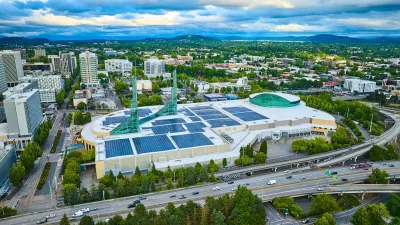Local energy “islands” within the larger power system ensure key facilities can remain online during emergencies and power outages.

This article by Alex Brown was originally published in Oregon Capital Chronicle.
Oregon lawmakers have passed a pair of bills to enable “microgrids” within the larger power system.
Microgrids are essentially local “islands” of energy generation and storage systems that connect to a utility but can operate independently when needed. Many are designed to serve community facilities such as hospitals and schools during emergencies.
California passed its own microgrid policy in 2018, but Oregon advocates say the new legislation there is the most ambitious in the nation.
If a utility needs to shut off transmission lines during a period of high wildfire danger, a community microgrid could use a combination of local solar and battery storage to keep key facilities online even while cut off from the main grid.
The pair of bills in Oregon passed with large, bipartisan majorities and are awaiting the expected signature of Democratic Gov. Tina Kotek.
One of the bills orders the Oregon Public Utility Commission to create a regulatory framework for private and community-owned microgrids. It also orders regulators to establish rules for buildings to connect to microgrids. Under the measure, local governments can establish “microgrid zones” with unique land-use regulations.
Oregon state Rep. Mark Gamba, a Democrat who serves as vice chair of the House Climate, Energy, and Environment Committee, said the state needs further changes to its land use to speed up permitting for energy projects. The microgrid legislation, he said, “cuts a little bit of red tape.”
“This is not the end-all, be-all on fixing the permitting system by any stretch, but this was what we could get passed this year,” Gamba said in an interview.
The other bill would allow a public utility or a third-party consultant to evaluate requests to connect a microgrid to the public power grid. Backers say it would help ease a regulatory bottleneck slowing clean energy projects, trade publication Utility Dive reported.
Rural communities are especially susceptible to power reliability issues, Dylan Kruse, president of Oregon-based nonprofit Sustainable Northwest, told Utility Dive.
Some utilities opposed the legislation, Oregon Public Broadcasting reported, saying it could be risky to allow third parties to connect to utility infrastructure. They cited their own work to establish microgrids with public partners.
Kruse told OPB that wildfires, heat waves and snowstorms are creating urgency to make the grid more resilient.
“We’re seeing challenges with the grid,” he said. “It’s impacting communities and we’re seeing a lot more of these outages and they are looking for alternatives to say, ‘Look, if the lights are going to go off, we’ve got to have some options here’.”
FULL STORY: Oregon approves ambitious framework for ’microgrids’

Planetizen Federal Action Tracker
A weekly monitor of how Trump’s orders and actions are impacting planners and planning in America.

Silicon Valley ‘Bike Superhighway’ Awarded $14M State Grant
A Caltrans grant brings the 10-mile Central Bikeway project connecting Santa Clara and East San Jose closer to fruition.

Amtrak Cutting Jobs, Funding to High-Speed Rail
The agency plans to cut 10 percent of its workforce and has confirmed it will not fund new high-speed rail projects.

Oregon Approves Ambitious Framework for ’Microgrids’
Local energy “islands” within the larger power system ensure key facilities can remain online during emergencies and power outages.

A Historic Investment in LA County’s Parks and Open Spaces
Los Angeles County has launched its largest-ever competitive grant program, investing $58 million to expand park access, enhance climate resilience, and support community-driven projects in the areas that need them most.

San Diego Wins $14M for Affordable Housing
The funding comes via the state’s Regional Early Action Planning program and will help create close to 1,000 new housing units.
Urban Design for Planners 1: Software Tools
This six-course series explores essential urban design concepts using open source software and equips planners with the tools they need to participate fully in the urban design process.
Planning for Universal Design
Learn the tools for implementing Universal Design in planning regulations.
Caltrans
City of Fort Worth
New Jersey Institute of Technology
Mpact (founded as Rail~Volution)
City of Camden Redevelopment Agency
City of Portland
City of Laramie





























